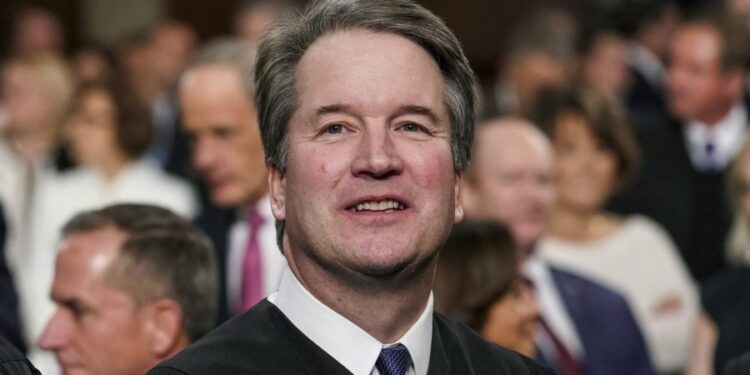
The man accused of showing up outside Supreme Court Justice Brett Kavanaugh’s home intending to kill him told authorities he wanted to “make the world a better place” and had been planning it for a month, according to court documents filed on Friday.
Nicholas Roske is headed to trial in June on one count of attempting to assassinate a Supreme Court justice after no plea agreement was reached. The transcript was made public Friday as part of a motion Roske filed arguing his statements are inadmissible and he was unconstitutionally searched.
“My plan was to kill Mr. Kavanaugh and then myself,” Roske told a special agent after being arrested and brought to a local police station, according to a transcript of the interview.
His public defenders argue Roske was not read his constitutional rights before police questioned him outside the conservative justice’s home. When authorities interviewed him at the police station hours later, Roske hadn’t validly waived his rights, his attorneys said.
Prosecutors are due to respond next month, but the new documents reveal the most detailed picture yet of Roske’s state of mind during the incident that nearly turned fatal and his psychiatric history.
He repeatedly connected his desire to kill Kavanaugh to being “actively suicidal” and a frustration about the recently leaked draft opinion showing that the Supreme Court was poised to overturn constitutional abortion protections.
“I’ve been suicidal for a long time, and when I saw that the leaked draft, it made me upset and then it made me want to — I don’t know. I was under the — I was under the delusion that I could make the world a better place by killing him,” Roske told authorities.
He also indicated he was also motivated by the Supreme Court “thinking about loosening gun restrictions” following recent mass shootings in Buffalo, N.Y., and Uvalde, Texas. Days later, the court issued a major expansion of Second Amendment rights.
“Hearing that this person that I was already upset with was planning on making it easier for people to do stuff like that, you know,” Roske said, later acknowledging the irony of him being able to obtain a firearm.
Roske told officials he had a medical condition triggered when he doesn’t take medication. The name of the condition was redacted, but the documents show he was due to take his next pill when he showed up at Kavanaugh’s home. Roske also said he had been placed in three previous psychiatric holds.
“I was thinking about killing pedophiles,” Roske explained.
“One of the biggest struggles with my (redacted condition) is having a sense of purpose, a sense that I’m doing something that matters, so I thought if I could, like, prevent a child from being raped, that would be good,” he continued.
On June 7, 2022, Roske flew from California to Dulles Airport, which is located in Northern Virginia. He landed just before midnight and took a taxi to Kavanaugh’s home in Maryland; Roske said the justice’s neighborhood was available on Wikipedia and he identified the exact home by matching a photo from a news article with images on Google Maps.
After arriving, Roske quickly abandoned his plans. He called 911 following a conversation with his sister, who dialed Roske with concern upon receiving a text in the middle of the night saying, “I love you.”
“She wanted to have me as a sibling for the rest of her life and not, you know, with that ending. Since I got a relationship and her perspective, I immediately decided to call 911 instead,” Roske said.
The 911 transcript, which was previously released by police, shows Roske talking with the dispatcher until officers arrived on scene.
A newly filed transcript of the officers’ bodycam footage shows Roske continued to answer questions and that officers at one point called his sister. The sister’s portion of the conversation wasn’t included in the transcript.
“He didn’t say he was going to kill himself? He didn’t say that? He didn’t say he was going to kill somebody else? No? Okay,” the officer said, according to the transcript.
Roske’s public defender on Friday also moved to suppress authorities’ search of Roske’s suitcase, backpack and gun case, saying it violated his constitutional rights.
Authorities recovered a pistol, crow bar, ammunition, zip ties and other weapons. Roske told investigators he bought the tools online on Amazon and had purchased his firearm from a gun store near where he lived in Simi Valley, Calif.
“Here, the government does not claim that there was a search warrant for any of the searched items. Thus, the search of the suitcase, backpack, and gun case along with the seizure of their contents are only lawful if the police officers’ conduct fits within one of the narrow exceptions to the Fourth Amendment’s warrant requirement,” Roske’s public defenders wrote.
“Mr. Roske expects the evidence presented at a hearing to show that the government cannot carry its burden in this respect,” they continued.






